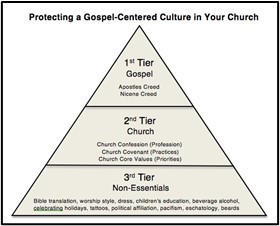Expect Unity from the Local Church


1 Peter 3:8—Finally, all of you, have unity of mind, sympathy, brotherly love, a tender heart, and a humble mind.
In 1 Peter 3:8, Peter lists Five Virtues for How Exiles Treat Each Other. This week on the blog we’ll discuss each of those virtues.
First, Peter commands us to “have unity of mind.” Peter is not asking for uniformity, where everyone thinks and acts exactly the same. He’s not asking us all to be clones of one another, to mute all our unique ideas and perspectives. He’s calling for unity of mission, unity of purpose.
Some look at this sort of call for unity and argue that Christians should never disagree or divide over anything. We just all need to get along, sing kumbaya and not talk about the things that divide us. That is not what Peter’s talking about here. In fact, I would suggest the unity Peter has in mind means we decide in advance what issues we’re willing to disagree about without dividing. And decide in advance which issues are worth dividing over.

At PBC we talk about three types of disagreements.[i] First tier issues are disagreements over some matter central to what it means to be a Christian. Who is Jesus? Did Jesus really die on the cross? Did He really rise from the dead? Was He really sinless? Is Scripture really God’s Word? Does God eternally exist in Trinity? Are we saved by works or by grace alone through faith? These first tier issues have been uncontested by Christians for 2000 years, and usually are clearly articulated in ancient statements of faith like the Apostles’ Creed and the Nicene Creed. If you disagree with us on these issues, we love you but we would say you’re not a Christian.
Second tier issues are disagreements that tend to divide Christians into different churches and denominations. We can disagree with you and still call you a Christian, but we’re probably not going to be able to attend church together. For example, if you believe in baptizing babies—not to save them, but to signify that you’ve dedicated them to the Lord—we would disagree with you. We wouldn’t say you’re not a Christian (unless you believed that baptism saves a person), but we would say that your views on baptism are so different than ours that you probably are going to have a hard time making PBC your church. The same could be said for issues like church leadership (Elders? Deacons? A board? A council? A solo pastor?), how we understand the Lord’s Supper, what we believe about membership, etc.
Third tier issues are disagreements on non-essential issues. Things like worship style, how we apply the Bible’s teaching on modesty, how we educate our children, views on alcohol consumption, how we think through politics, how or whether to celebrate certain holidays, etc. Having unity of mind doesn’t require we all agree on all these things.
I once interviewed for a church that wouldn’t have me because I didn’t share their exact view on the timing of Jesus’ return. That is Christian fundamentalism, which takes every issue and make it a first-tier issue. “You must agree with us on everything or you’re not welcome here! Shape up or ship out!”
I once attended a different church where some of the members in good standing were flirting with Mother God theology, and they were accepted because of everything they did to reach their community. That is Christian liberalism, which takes every issue and makes it a third-tier issue. “No matter what you believe, we affirm you and accept you! We’ll have unity with anyone and everyone, regardless of what they believe.”
Evangelicalism is different. Evangelicalism says, “in essentials unity, in non-essentials liberty, and in all things charity.” That’s what God has given us at Poquoson Baptist Church. In this congregation you will find people with different views on the End times, on educating our children, on alcohol consumption, on worship styles, on political engagement, on how to approach the voting decision, and more. But what we do have is an incredible unity.
I’ve been in churches long enough to know that what we have isn’t normal, it’s supernatural. I’ve been in enough church business meetings in thirty-six years to know that things aren’t always this way. Over a year ago we made the decision as a church to change our constitution to reflect the Bible’s teaching on elder leadership. That decision, which has split many churches, was unanimous here at PBC. By God’s grace, we are a united church.
But Christian unity is like a garden. It needs to be watered and weeded. It needs to be cared for. PBC Member, what role are you playing in cultivating a spirit of unity here at this church? How can God use you to strengthen our unity as a church?
We should expect the local church to be a place of unity.
[i] Image Credit: https://www.visionroom.com/protecting-a-gospel-centered-culture-in-your-church/. The concept of “Theological Triage” was first presented by Al Mohler, https://albertmohler.com/2005/07/12/a-call-for-theological-triage-and-christian-maturity.
.png)